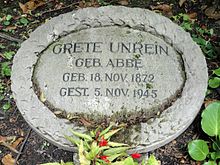Grete unclean
Grete Unrein (born November 18, 1872 in Jena ; † November 5, 1945 there ) was a German politician during the Weimar Republic and mainly active in the field of social welfare . She was the oldest daughter of Ernst Abbe and married to Otto Unrein , the first rector of the Jena Lyceum , which opened in 1912 .
Life
Since the founding of the Jena Children's Hospital, Grete Unrein has been striving to improve the economic situation of this facility.She was the head of the Jena mother home, member of the board and, for many years, chairwoman of the patriotic institute of the women's associations of the Red Cross (known as the main women's association for short), of which she is chairwoman from 1931 to 1933 was, as well as sponsor and board member of the reading hall association. She saw one of her most important tasks in creating equal opportunities for girls and young women in training for their own profession and practicing it. It is thanks to the tireless work of Grete Unrein that the city took on this task and decided to build a 'higher school for girls', the Lyceum. Thanks to the work of the Unrein couple, the lyceum was expanded up to the Abitur.
In 1919 she ran as a member of the DDP for the Jena City Council, was elected and, as an active member of the youth welfare office, was a member of this political body until 1933. In 1932 she was elected 2nd chairman of the city council. In the same year the city decided to give her honorary citizenship on her 60th birthday "... in appreciation of her services to the common good, especially in the area of welfare work" (minutes of the city council meeting). From 1932 to 1932 she was chairwoman of the housewives' association in Jena. At the city council meeting on March 9, 1933, at which the NSDAP seized control of the Jena city administration, it, like the city councils of the SPD and KPD , did not take part in protest. During the years of the National Socialist dictatorship, she often had to fend off political and personal hostility. During these years she stood up for Jewish citizens and those persecuted by the Nazi regime and provided moral and financial help. She was the sole heir to Clara Rosenthal , a Jewish woman who had been driven to suicide in 1941 and whose family her father was very familiar with.
After the end of World War II , she was one of the first members of the newly founded Liberal Democratic Party ( LDP , successor to the DDP). Her poor health caused her strength to weaken. She died on November 5, 1945 in her house at Johann-Friedrich-Strasse 3 in Jena. She was buried in the Jenaer Nordfriedhof , Grabfeld UH II, Grab 69.
Grete Unrein Prize
The Young Liberals Jena-Weimar have been awarding the Grete-Unrein Prize annually since 2005 for “special voluntary commitment in the field of youth work ”. The prize is endowed with a total of 700 € and is divided between a first and two second places.
Web links
Individual evidence
- ↑ Profession: Woman, work biographies in Jena from the beginning to the middle of the 20th century, dissertation to obtain the academic degree Doctor philosophiae (Dr. phil.), P. 42, PDF file, p. 46
- ↑ Grete Unrein Prize ( Memento of the original from December 22, 2015 in the Internet Archive ) Info: The archive link was automatically inserted and not yet checked. Please check the original and archive link according to the instructions and then remove this notice. , on: Website of the Junge Liberalen Jena-Weimar, accessed on December 19, 2015
| personal data | |
|---|---|
| SURNAME | Unclean, Grete |
| BRIEF DESCRIPTION | Jena politician |
| DATE OF BIRTH | November 18, 1872 |
| PLACE OF BIRTH | Jena |
| DATE OF DEATH | November 5, 1945 |
| Place of death | Jena |
